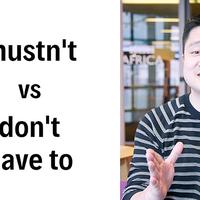Mustn't vs Don't have to - English In A Minute - YouTube
Mustn't vs Don't have - English In A Minute - YouTube
Mustn't vs Don't have to - English In A Minute - YouTube
Mustn't vs Don't have to - Inglês num minuto - YouTube
Mustn't vs Don't have to - English In A Minute - YouTube
Mustn't vs Don't have to - Bir Dakikada İngilizce - YouTube
Mustn't vs Don't have to - English In A Minute - YouTube
不得与不必 - 一分钟英语 - YouTube
不得與不必 - 一分鍾英語 - YouTube
Hi guys! This is Kee from BBC Learning English.
Hallo Leute! Das ist Kee von BBC Learning English.
Merhaba millet! Ben BBC Learning English'ten Kee.
Today, I'm going to tell you the differences
Heute erkläre ich euch die Unterschiede
Bugün size farkları anlatacağım.
between mustn't and don't have to.
zwischen dürfen und müssen nicht.
yapmamalı ve yapmamalı arasında.
Now, must and have to are similar in meaning.
Nun, must und have to haben eine ähnliche Bedeutung.
Şimdi, must ve have to anlam bakımından benzerdir.
They are both used to describe obligations.
Sie werden beide verwendet, um Verpflichtungen zu beschreiben.
Her ikisi de yükümlülükleri tanımlamak için kullanılır.
However, their negative forms
Allerdings ihre negativen Formen
Ancak olumsuz biçimleri
are completely different in meaning.
haben eine völlig andere Bedeutung.
anlam bakımından tamamen farklıdır.
We still use mustn't to talk about obligations.
Wir verwenden immer noch Must't, um über Verpflichtungen zu sprechen.
Hala zorunluluklardan bahsetmek için mustn't kullanıyoruz.
For example:
Zum Beispiel:
Örneğin:
In the house, I mustn't wear shoes.
Im Haus darf ich keine Schuhe tragen.
You know, to keep the house clean.
Sie wissen schon, um das Haus sauber zu halten.
Bilirsin, evi temiz tutmak için.
But don't have to does not describe obligations,
Aber nicht müssen beschreibt keine Pflichten,
Ancak zorunlulukları tarif etmek zorunda değilsiniz,
so the choice is yours!
Sie haben also die Wahl!
Yani, seçim senin!
For example, if your teacher said:
Wenn dein Lehrer zum Beispiel gesagt hat:
you don't have to do your homework,
Du musst deine Hausaufgaben nicht machen,
well... then choice is yours.
naja...dann hast du die wahl.
peki... o zaman seçim senin.
You can say:
Sie können sagen:
Söyleyebilirsin:
Alright, I won't!
Okay, werde ich nicht!
알았어요, 안 할게요!
Tamam, yapmayacağım!

